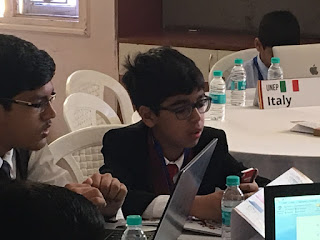The MUN in
Oakridge was definitely an exciting opportunity for
everyone, and even if some
of us didn’t get awards, I’m sure we all enjoyed the experience. Since this was
the first MUN for most of us, including me, we had to learn all the rules and
procedures, make our speeches, and prepare everything in a very short time, but
we managed it all. This helped us improve our time-management skills, and
further helped us in Oakridge.
My first day
went great; the chairs were extremely helpful and explained all the procedures
before we started. The hardest part was probably framing the speeches in a
short time limit. Our ultimate goal was to win an award, and to do that, we had
to make as many speeches as possible. What was even more challenging, was to
make our speeches, and have valid information, since the agenda requires deep
research.
Model United
Nations helped me get a deeper understanding of global problems since most of
the topics given were current problems, just as in a real United Nations
conference. It also improved my critical thinking skills, since it taught me
how to think and research fast and in-depth. It especially taught me how to be
more spontaneous, because with more than 40 people in the room, we wanted to be
the people who spoke as much as possible, which meant being quick at speaking,
framing, and delivering speeches.
My committee (ECOSOC) discussed
about child marriage and its effects, everybody spoke their views on the AGENDA
before getting into serious discussion about our sub-topics, such as solutions
for the cause, how this affects girls, and many other interesting
debates/discussions.
Other committees
had different agendas, such as DISEC, which discussed Improving the
humanitarian situation in regions affected by the Syrian Civil War, and HRC
talked about Preventing the discrimination of physically or mentally disabled
people, especially in cases of employment and inclusion in popular media. Other
committees, like ILO worked on Protecting the rights of migrant and immigrant
workers. SC suggested how to De-escalate the crisis in the South Sudanese
region. All other committees included different agendas about world problems,
which were discussed in debates, caucuses, and by lobbying.
The last day was
probably the day with the most pressure. All our hard work had summed up to
this. We had to make as many friends as possible, and make them sign our
resolution. Although this didn’t help us win awards, it contributed to our
marks a lot.
In the end, all
of us were proud of our efforts, regardless of whether we won an award or not.
This was definitely an enriching experience for all of us and I can’t wait to
try again next year.


